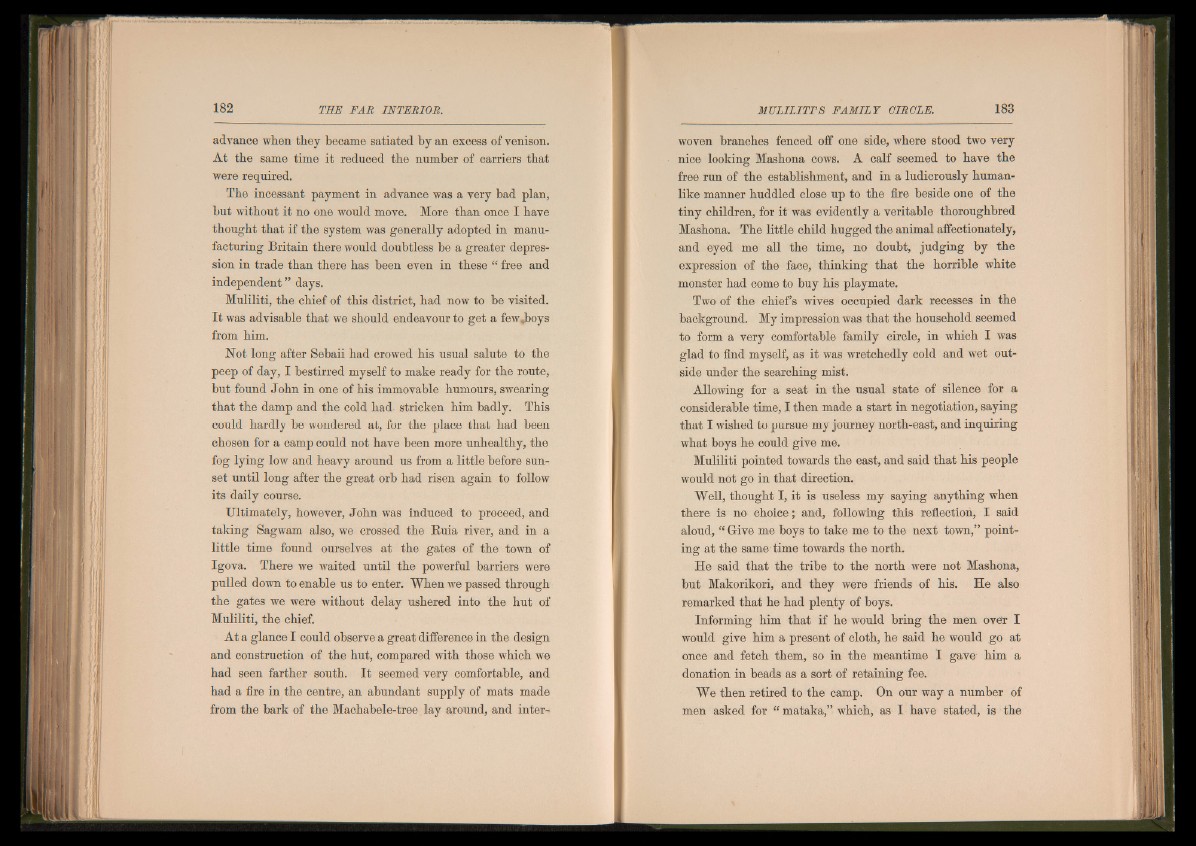
advance when they became satiated by an excess of venison.
At the same time it reduced the number of carriers that
were required.
The incessant payment in advance was a very bad plan,
hut without it no one would move. More than once I have
thought that if the system was generally adopted in manufacturing
Britain there would doubtless be a greater depression
in trade than there has been even in these “ free and
independent ” days.
Muliliti, the chief of this district, had now to be visited.
I t was advisable that we should endeavour to get a few Jboys
from him.
Not long after Sebaii had crowed his usual salute to the
peep of day, I bestirred myself to make ready for the route,
but found John in one of his immovable humours, swearing
that the damp and the cold had stricken him badly. This
could hardly be wondered at, for the place that had been
chosen for a camp could not have been more unhealthy, the
fog lying low and heavy around us from a little before sunset
until long after the great orb had risen again to follow
its daily course.
Ultimately, however, John was induced to proceed, and
taking Sagwam also, we crossed the Buia river, and in a
little time found ourselves at the gates of the town of
Igova. There we waited until the powerful barriers were
pulled down to enable us to enter. When we passed through
the gates we were without delay ushered into the hut of
Muliliti, the chief.
At a glance I could observe a great difference in the design
and construction of the hut, compared with those which we
had seen farther south. I t seemed very comfortable, and
had a fire in the centre, an abundant supply of mats made
from the bark of the Machabele-tree lay around, and interwoven
branches fenced off one side, where stood two very
nice looking Mashona cows. A calf seemed to have the
free run of the establishment, and in a ludicrously humanlike
manner huddled close up to the fire beside one of the
tiny children, for it was evidently a veritable thoroughbred
Mashona. The little child hugged the animal affectionately,
and eyed me all the time, no doubt, judging by the
expression of the face, thinking that the horrible white
monster had come to buy his playmate.
Two of the chief’s wives occupied dark recesses in the
background. My impression was that the household seemed
to form a very comfortable family circle, in which I was
glad to find myself, as it was wretchedly cold and wet outside
under the searching mist.
Allowing for a seat in the usual state of silence for a
considerable time, I then made a start in negotiation, saying
that I wished to pursue my journey north-east, and inquiring
what boys he could give me.
Muliliti pointed towards the east, and said that his people
would not go in that direction.
Well, thought I, it is useless my saying anything when
there is no choice; and, following this reflection, I said
aloud, “ Give me boys to take me to the next town,” pointing
at the same time towards the north.
He said that the tribe to the north were not Mashona,
but Makorikori, and they were friends of his. He also
remarked that he had plenty of boys.
Informing him that if he would bring the men over I
would give him a present of cloth, he said he would go at
once and fetch them, so in the meantime I gave him a
donation in beads as a sort of retaining fee.
We then retired to the camp. On our way a number of
men asked for “ mataka,” which, as I have stated, is the